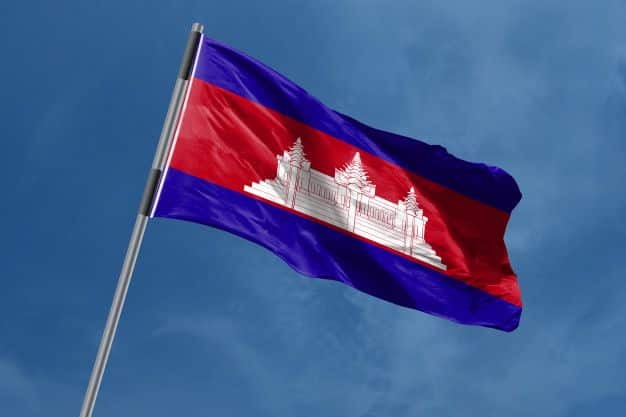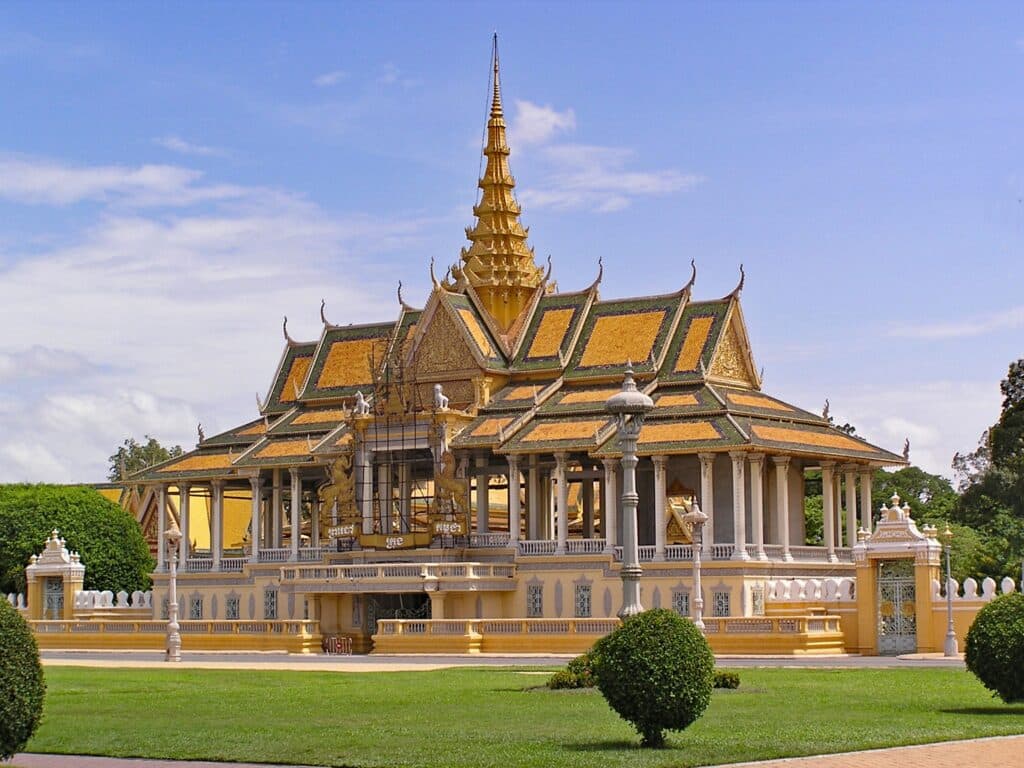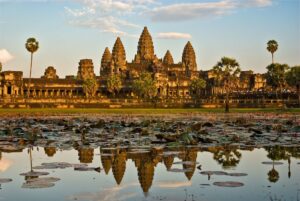Great news if you’re wondering how to retire in Cambodia. There are probably no other countries in Asia that make it as simple for expats to move and retire with the least amount of paperwork, formalities, and financial requirements.
In order to enter Cambodia, all you have to do is fill out a quick form at the airport, present two passport photos, and pay $35 for either a business or ordinary visa that has a validity of one month.
Once you are in Cambodia, all you need to do is extend your visa for a period of one year, which costs less than $300. The extension enables you to live in the country and come and go as you please without having to meet the strict financial requirements demanded by many other Southeast Asian nations. The government is happy to welcome another visitor from abroad to back the local economy, so long as you conduct yourself well.
Due to the nation’s economic growth since the 1990s, the major cities of Phnom Penh and Siem Reap provide all the modern conveniences you could desire. There are numerous international banks, restaurants, clubs and bars, hotels, serviced apartments, malls, theaters, telecom and internet service providers, and much more.
All of those make moving so much simpler because you can easily arrive in Cambodia and quickly set up residence, a bank account, a phone number, internet access, and all other modern conveniences that you need.
If you are looking to invest as an expat or high-net-worth individual, which is what I specialize in, you can email me (advice@adamfayed.com) or use WhatsApp (+44-7393-450-837).
How to Retire in Cambodia: Cost of Living

There are many expats who have moved to Cambodia specifically because of the country’s extraordinarily low cost of living, which makes it a desirable destination for any retiree receiving a fixed pension or Social Security check. In fact, Cambodia has one of the lowest costs of living in all of Southeast Asia.
So how much will living in Cambodia cost you? There is no definitive answer as typical monthly budgets can range from $1,000 to $2,500, with many expats claiming they can live comfortably on an average of $1,500.
The largest monthly expense is typically lodging, but rentals in cities like Phnom Penh, Sihanoukville, and Siem Reap can be found for as cheap as $250 for an apartment with one bedroom inside a nice neighborhood.
If you depend on air conditioning or are happy with a basic fan, the price of utilities like electricity will vary. In either case, the majority of expats pay a total of $100 per month for their cable, water, garbage, and electricity bills. The cost of cellphones and mobile internet is very low in this country. You can stay online for $10 a month and you only need to shell out less than 5 cents per minute to make international calls.
For $50 a month, you can hire a maid to wash your clothes and clean your home several times a week if you don’t want to spend your time doing housework. This is a cost that is well worth it if you would rather spend your time engaging in more leisurely activities.
The numerous supermarkets and minimarts in the major cities of Cambodia continue to offer many grocery options that are cheap. There are also a wide variety of local and international restaurants where you can have your meals for a few dollars.
Cambodia might be the perfect location for your new life of luxury if you’re looking to retire in comfort without having to scrounge every last dollar together to survive.
Why Should You Retire in Cambodia
Affordable Accommodation
A brand-new one-bedroom apartment with all the amenities in the heart of Phnom Penh can be purchased for less than $50,000 in Cambodia. A pre-owned apartment costs between $30,000 and $40,000 in the capital, while a home outside the area with two to three bedrooms costs $50,000. Of course, this depends on the quality of life you desire.
For renting in Phnom Penh, prices stand at between $350 and $500 a month for a modern unit with a single bedroom. The $500 price tag is for a brand new unit that includes certain amenities.
Similar to buying, renting can be more affordable if you live farther out or choose a lower-quality apartment.
Visit Facebook Marketplace if you’re looking for something incredibly cheap. Choose Cambodia as your filter, and then select Property Rentals or House Sales. Recall that all prices are in local currency.
You’ll be directly transacting with the homeowner if you plan to acquire a property in Cambodia. Make sure you obtain the appropriate legal counsel before making a purchase to ensure that the paperwork is in order, just as you would with buying any property in any country.

Cheap Meals
We will examine street food, a budget restaurant, and an upscale restaurant because
Food in Cambodia is incredibly affordable if you choose to eat street food or even if you dine in either a budget or upscale restaurant. You can eat on the street for anywhere from $0.50 to $1. A meal at a budget restaurant will cost you about $2.5, while a meal at a pricey restaurant can cost you between $10 and $20.
Wide Array of Activities
There are plenty of activities to keep you occupied when you retire in Cambodia. You can scour the markets for fresh produce or go and splurge on inexpensive shopping. There are also tours you can join that focus on architecture, history, culture, and the arts.
Great People
Every Asian nation has its own distinct character, but the people of Cambodia may be among the friendliest in all of Southeast Asia. 17 million of Cambodia’s nearly 19 million citizens are ethnic Khmers, who make up 90% of the country’s population. They converse in a language called Khmer, which is really akin to those of their nearby neighbors Laos and Vietnam.
In spite of their extreme poverty, the people of Cambodia still enjoy life and are content with what they have. They are tranquil and constantly ready to assist visitors and foreign nationals. This cannot be said of some other Asian regions where there is a small amount of hostility toward foreigners and the way of life they lead.
Low-cost Medical Care and Insurance
Medication in Cambodia is very affordable and almost everything is accessible over the counter. Routine illnesses like the flu or stomach bugs can usually be treated by doctors quickly and easily. Besides, high-end hospitals and clinics in Phnom Penh typically have excellent medical staff who are fluent in English. There are also a few Western doctors available in the country.
If you’re on a permanent visa, your options for insurance are either the local healthcare system or private health insurance through a global provider. Prices for a global insurance cover package start at about $450 per month and can go as high as $770 for premium level coverage.
For instance, a 65-year-old person can get a discount worth $150 if he/she pays 30% of the treatment costs up to a maximum of $5,000 out of pocket, according to Cigna Global Health Insurance.
Although the free public healthcare system is currently underdeveloped and slow compared to western hospitals, it is improving every year. There is a different way you could trim your monthly insurance if the prices listed above are too high. In the event of a major medical emergency, you have the option of paying a deductible, which entails a one-time payment for major medical costs up front and lowers your monthly payment.
Laid Back Lifestyle
The pace of life is a little slower in Cambodia than in its neighbors Vietnam and Thailand due to a smaller population.
Easy Access to All of Asia
You can always use Cambodia as a base because flights are so inexpensive once you arrive in South East Asia. You can visit the neighboring countries of Thailand for shopping and Vietnam for beaches and tourist attractions.
Less Crowded
As we’ve already mentioned, Cambodia is considerably less populated than its neighbors, and less population means less trash, traffic, and noise in general. If you are retiring there, this is fantastic news. If you reside on the outskirts of a larger city, you can always take a local bus or tuk tuk (motorized 3-wheeled rickshaws) into the city.
English Tutoring
You can always teach English if you’re looking for something to do in your retirement or simply something to supplement your retirement funds. After completing a brief online Tesol course, you can start teaching English to the locals who appreciate native speakers.
Constant Temperature
The temperature in Cambodia ranges from 72 degree Fahrenheit to 95 degree Fahrenheit, or 22 degree Celsius to 34 degree Celsius. Anyone with arthritis will appreciate the weather, and most places have air conditioning if you need it.
Very Safe
Cambodia is a very safe country, especially for foreigners who will notice that they are treated better than locals and are protected by special laws in most southeast Asian nations.
Simple travel safety precautions should be followed, just like you would anywhere else, as minor robberies can occur outside of popular tourist destinations and cities. Avoid flashing large sums of cash in slum areas late at night.
Why You Should Not Retire in Cambodia
Infrastructure and Transport System
You should be aware that infrastructure and transport system will not be as flawless as you are accustomed to.
Very Humid
If you are not accustomed to the tropics, the constant 80% humidity will be a significant adjustment. Higher humidity levels have some advantages, such as being better for your skin. The combination of temperature and humidity is also excellent for easing the aches and pains associated with aging.
Inefficient Healthcare Services
Receiving medical care can be a mixed bag in Cambodia as it is still a developing country. Aside from the positives that were mentioned above, the negatives consist of the fact that many people (including locals) choose to visit doctors in Thailand, Vietnam, or Singapore for serious medical conditions. The quality of care is generally higher and still quite affordable in those neighboring territories.
There can also be bogus drug sellers in Cambodia so you have to make sure the pharmacy where you are purchasing your medication from is accredited and has good reputation.
How to Retire in Cambodia: Getting a retirement visa
Getting a visa in Cambodia is a fairly simple process. For retirees specifically, there is a special category. Make sure you obtain the regular (E class) visa upon arrival rather than a tourist visa in order to obtain the Cambodia retirement visa.
Below are the requirements for securing a retirement visa:
- You must be 55 years old and above
- You must be unemployed
- You must prove that you are retired via a pension or social security documentation
- You must demonstrate that you have sufficient funds, which generally means a bank statement showing a monthly pension or lump sum in your account
Following that, you will merely submit an application for ER (retirement) extensions. These extensions may be valid for various lengths to a maximum of one year. The costs are comparable to those of working visa extensions, which run about $290 for an entire year with multiple entries. You can get assistance with processing by visiting any local travel agency.
Do note that if you are an ER holder and immigration officials find you breaking the law, you could be slapped with a fine, be put to jail, or even deported from Cambodia.
Every expat is also mandated to register on the Foreigners Present in Cambodia System that was rolled out in 2019.

How to Retire in Cambodia: Places to Consider
The most popular place to retire in Cambodia is in Phnom Penh. The capital has everything any retiree could need or want from good food, a range of entertainment, and amiable company. Phnom Penh also has convenient access to essential public and medical services.
However, if you still want some urban comforts and a rapidly modernizing city doesn’t appeal to you, Siem Reap or Sihanoukville might be a good option. These are more crowded with tourists traveling to the famous Angkor Wat Temples or the islands off the southern coast, but they don’t have the same lifestyle as Phnom Penh.
The growing portfolio of real estate projects in Siem Reap itself can keep any retiree entertained in their golden years. It is more relaxed, offers excellent food and beverage options, is close to nature, and has a thriving arts and culture scene.
Sihanoukville has undergone significant development, and the sprawling city is now the entry point to the lovely islands.
Even though they are more reserved, Kampot and Battambang are becoming more and more well-liked among expats and retirees for their way of life.
How to Retire in Cambodia: Staying Active
Finding a useful hobby is simple in Cambodia if you’re the athletic type. There are clubs for all different sports, such as tennis, golf, and running. Cambodia is also fantastic if you enjoy riding or fixing motorcycles. All seasons in the country are suitable for riding.
If helping others is more your style, there are many non-government organizations (NGOs) in the area that require your assistance. Even though many reputable NGOs and schools require background checks, you could volunteer and mentor nearby children.
How to Retire in Cambodia: Travel Bug
If you’re a retiree from the West who has chosen to live in Cambodia, it’s likely that you’re already bit by the travel bug.
Fortunately, the nation is situated in the heart of Southeast Asia, one of the world’s most well-liked tourist destinations.
A quick flight will take you to Malaysia, Indonesia, Thailand, Vietnam, Singapore, Hong Kong, and several other countries. China, India, Australia, Japan, and South Korea are farther away but still easily accessible.
Bottom Line
At a much lower cost, Cambodia is an excellent substitute for Thailand. With a rapidly expanding expat community and infrastructure, the nation is a promising place to live and retire. Particularly in comparison to their Thai neighbors, the locals are also very hospitable. Cambodians are friendly and sincere, and they are less likely to take advantage of foreigners and visitors. Anyway, the general atmosphere of a community including its people is a great consideration in choosing a retirement location. Assess your own needs and see if Cambodia checks many – if not all – boxes from your list.
Pained by financial indecision?

Adam is an internationally recognised author on financial matters with over 830million answer views on Quora, a widely sold book on Amazon, and a contributor on Forbes.




Hello Adam
Thank you for sharing your information on Cambodia.
I am retired in Thailand. I am seeking information on the financial requirements to retire in Cambodia.
I recently read there is a tax of 20% on salaries. is there any tax on pensions or other money coming into Cambodia.
Thank you for assisting me.
Sincerely
William
Thanks, William. I will email you.